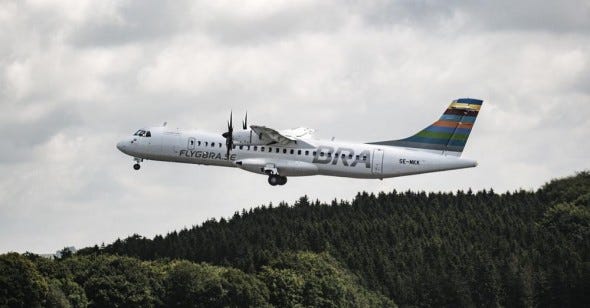Change the messaging to increase the appeal of voluntary offsetting schemes
Issue #16 of Sustainability in the Air Newsletter
In a previous episode of our podcast, CarbonClick's founders discussed with Shashank Nigam, why passenger participation in voluntary offsetting schemes is so low.
Much of it comes down to schemes not being integrated into the booking process and a lack of understanding of the programme and its effectiveness.
A group of academics at the University of Queensland went further and found that the kind of messaging the passenger is presented with makes a big difference to the overall uptake.
In "Improving Carbon Offsetting Appeals in Online Airplane Ticket Purchasing: Testing New Messages, and Using New Test Methods”, researchers said that pictorial and short textual information around three key themes - effectiveness, transparency and choice - work best.
Participants in a study were given messages about carbon offsetting, using the Australian airline Qantas as an example.
The boilerplate message that Qantas had at the time was “Want to fly carbon neutral? By flying carbon neutral you will be helping to conserve the environment and nourish communities."
This actually worked worst.
But what did work and increase participation were visual messages around effectiveness, transparency and choice.
The effectiveness message involved participants seeing a series of boxes with an image. For example, one small box had a picture of some soil held in someone’s hands with a short text that talked about the “reforestation of 20,000 acres of rainforests across the Amazon.”
The transparency message had the heading “Where does my money go”, with another series of pictorial boxes representing different projects with a % figure beside each (e.g. 30% to conserving Tasmania’s wilderness, 30% to improving Cambodian air quality” etc).
The choice message then allowed consumers to say where their contribution would go, again with picture boxes (e.g “Protecting Amazing Rainforest”, “Vietnam Biogas Project”, “Ugandan Cookstoves.”)
The authors stress that you only have a relatively small amount of the passenger’s time and attention during the booking process and how the information is presented is key: “Online bookings are time sensitive and so short text and images showing the outcomes of offsetting could encourage adoption. Our findings are of practical importance.”
"They point to specific features about such messages that elicit stronger reactions from study participants and therefore are promising elements for use in carbon offsetting messages on actual online booking platforms.”
ATR operates the first ever 100% SAF-powered flight
Aircraft manufacturer ATR has been trying to persuade airlines to replace fuel-intensive jets on regional routes with more efficient and greener turboprops.
One possible selling point last week was the introduction of the ATR ‘X-Space’ seating concept, revealed at AIX in Hamburg.
ATR bills X-Space as a “plug and play” solution that allows airlines to convert seat duos into premium seats, with the aisle-side seat’s back and pan removed and replaced with a side table.
Now ATR further burnished its environmental credentials by working with SAF provider Neste and Swedish carrier Braathens Regional Airlines to operate the first ever 100% SAF-powered test flight on a commercial regional aircraft.
This historic test flight took place in Sweden and is part of the 100% sustainable aviation fuel (SAF) certification process of ATR aircraft that started in September 2021 in cooperation with Braathens and Neste and should be completed by 2025.
It has been the latest in a series of successful ground and flight tests on the ATR 72-600 prototype aircraft performed at the beginning of 2022, including flights with 100% SAF in one engine, and today it was the first time it was done with 100% SAF in two engines.
Positive story of the day
Finnair Partners With Gevo To Purchase 7 Million Gallons Of SAF A Year From 2027 (Simple Flying)
Sustainability news
Turkish Airlines Awarded with Top IATA Environmental Certificate (FTN News) The truths behind the eco-friendly aircraft trend (The Points Guy) Viva Aerobus makes its first flight with sustainable fuel (Aviaconline) United announces CO2 agreement with Dimensional Energy (Breaking Travel News) Cute: ANA's Airbus A380s Celebrate World Sea Turtle Day (Simple Flying)



